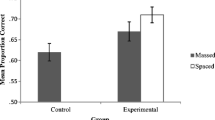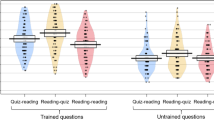Abstract
Retrieving information from memory increases the likelihood the information will be remembered later. The strategic use of retrieval to enhance memory is known as retrieval practice. Teachers can exert considerable control over students’ retrieval practice, dictating when and how much students practice. Laboratory research has shown that retention benefits from increasing the amount of practice (i.e., the number of times information is retrieved) and from spacing practice out over time. Although retrieval practice is a prominent part of the learning experience in certain educational domains, such as mathematics, relatively little research has examined how retention of actual classroom content is affected by increasing the amount and spacing of retrieval practice. Here, we implemented a complete within-subjects crossing of practice amount (baseline versus increased) and practice spacing (baseline versus increased) in a precalculus course for engineering students. Practice consisted of answering quiz questions. We assessed retention of precalculus knowledge at two educationally relevant time points: the end of the precalculus course (within-semester) and the beginning of a calculus course 4 weeks later (across-semester). Within-semester retention benefited significantly from practicing more and from spacing out practice, although some evidence suggested that the effect of amount of practice was less robust than the effect of spacing. Across-semester retention benefited exclusively from increasing spacing. Given that retaining precalculus knowledge across semesters is crucial for success in higher-level mathematics, these findings support increasing spacing in real-world mathematics education. We discuss how our findings fit within the larger literature on the memory-enhancing effects of retrieval practice.




Similar content being viewed by others
References
Adesope, O. O., Trevisan, D. A., & Sundararajan, N. (2017). Rethinking the use of tests: a meta-analysis of practice testing. Review of Educational Research, 87(3), 659–701.
Balch, W. R. (1998). Practice versus review exams and final exam performance. Teaching of Psychology, 25(3), 181–185.
Bjork, R. A., & Bjork, E. L. (1992). A new theory of disuse and an old theory of stimulus fluctuation. In A. Healy, S. Kosslyn, & R. Shiffrin (Eds.), From learning processes to cognitive processes: essays in honor of William K. Estes (Vol. 2, pp. 35–67). Hillsdale, NJ: Erlbaum.
Bjork, E. L., & Bjork, R. A. (2014). Making things hard on yourself, but in a good way: creating desirable difficulties to enhance learning. In M. A. Gernbacher & J. Pomerantz (Eds.), Psychology and the real world: essays illustrating fundamental contributions to society (2nd edition) (pp. 59–68). New York: Worth.
Bloom, K. C., & Shuell, T. J. (1981). Effects of massed and distributed practice on the learning and retention of second-language vocabulary. Journal of Educational Research, 74(4), 245–248.
Carpenter, S. K. (2012). Testing enhances the transfer of learning. Current Directions in Psychological Science, 21(5), 279–283.
Carpenter, S. K., Cepeda, N. J., Rohrer, D., Kang, S. H. K., & Pashler, H. (2012). Using spacing to enhance diverse forms of learning: review of recent research and implications for instruction. Educational Psychology Review, 24(3), 369–378.
Cepeda, N. J., Pashler, H., Vul, E., Wixted, J. T., & Rohrer, D. (2006). Distributed practice in verbal recall tasks: a review and quantitative synthesis. Psychological Bulletin, 132(3), 354–380.
Cepeda, N. J., Vul, E., Rohrer, D., Wixted, J. T., & Pashler, H. (2008). Spacing effects in learning: a temporal ridgeline of optimal retention. Psychological Science, 19(11), 1095–1102.
Cepeda, N. J., Coburn, N., Rohrer, D., Wixted, J. T., Mozer, M. C., & Pashler, H. (2009). Optimizing distributed practice: theoretical analysis and practical implications. Experimental Psychology, 56(4), 236–246.
Dunlosky, J., Rawson, K. A., Marsh, E. J., Nathan, M. J., & Willingham, D. T. (2013). Improving students’ learning with effective learning techniques: promising directions from cognitive and educational psychology. Psychological Science in the Public Interest, 14(1), 4–58.
Fishman, E. J., Keller, L., & Atkinson, R. C. (1968). Massed versus distributed practice in computerized spelling drills. Journal of Educational Psychology, 59(4), 290–296.
Goossens, N. A. M. C., Camp, G., Verkoeijen, P. P. J. L., Tabbers, H. K., & Zwaan, R. A. (2012). Spreading the words: a spacing effect in vocabulary learning. Journal of Cognitive Psychology, 24(8), 965–971.
Hintzman, D. L. (1976). Repetition and memory. In G. H. Bower (Ed.), The psychology of learning and motivation: advances in research and theory (Vol. 10, pp. 47–91). New York: Academic Press, Inc.
Hopkins, R. F., Lyle, K. B., Hieb, J. L., Ralston, P. A. S. (2016). Spaced retrieval practice increases college students’ short- and long-term retention of mathematics knowledge. Educational Psychology Review 28(4), 853–873.
Kang, S. H. K. (2016). Spaced repetition promotes efficient and effective learning: policy implications for instruction. Policy Insights From the Behavioral and Brain Sciences, 3(1), 12–19.
Kapler, I. V., Weston, T., & Wiseheart, M. (2015). Spacing in a simulated undergraduate classroom: long-term benefits for factual and higher-level learning. Learning and Instruction, 36, 38–45.
Karpicke, J. D. (2012). Retrieval-based learning: active retrieval promotes meaningful learning. Current Directions in Psychological Science, 21(3), 157–163.
Karpicke, J. D., & Bauernschmidt, A. (2011). Spaced retrieval: absolute spacing enhances learning regardless of relative spacing. Journal of Experimental Psychology: Learning, Memory, and Cognition, 37, 1250–1257.
Karpicke, J. D., & Roediger, H. L., III. (2007). Expanding retrieval practice promotes short-term retention, but equally spaced retrieval enhances long-term retention. Journal of Experimental Psychology: Learning, Memory, and Cognition, 33, 704–719.
Leeming, F. C. (2002). The exam-a-day procedure improves performance in psychology classes. Teaching of Psychology, 29(3), 210–212.
Lyle, K. B., & Crawford, N. A. (2011). Retrieving essential material at the end of lectures improves performance on statistics exams. Teaching of Psychology, 38(2), 94–97.
McDaniel, M. A., Anderson, J. L., Derbish, M. H., & Morrisette, N. (2007). Testing the testing effect in the classroom. European Journal of Cognitive Psychology, 19(4-5), 494–513.
McDaniel, M. A., Agarwal, P. K., Huelser, B. J., McDermott, K. B., & Roediger, H. L. (2011). Test-enhanced learning in a middle school science classroom: the effects of quiz frequency and placement. Journal of Educational Psychology, 103(2), 399–414.
McDaniel, M. A., Wildman, K. M., & Anderson, J. L. (2012). Using quizzes to enhance summative-assessment performance in a web-based class: an experimental study. Journal of Applied Research in Memory and Cognition, 1(1), 18–26.
Miyatsu, T., Nguyen, K., & McDaniel, M. A. (2018). Five popular study strategies: their pitfalls and optimal implementations. Perspectives on Psychological Science, 13(3), 390–407.
Pyc, M. A., & Rawson, K. A. (2009). Testing the retrieval effort hypothesis: does greater difficulty correctly recalling information lead to higher levels of memory? Journal of Memory and Language, 60(4), 437–447.
Rawson, K. A., & Dunlosky, J. (2011). Optimizing schedules of retrieval practice for durable and efficient learning: how much is enough? Journal of Experimental Psychology: General, 140(3), 283–302.
Rawson, K. A., Dunlosky, J., & Sciartelli, S. M. (2013). The power of successive retention: improving performance on course exams and long-term retention. Educational Psychology Review, 25(4), 523–548.
Robin F. H., Keith B. L., Jeff L. H., Patricia A. S. R., (2016). Spaced retrieval practice increases college students’ short- and long-term retention of mathematics knowledge. Educational Psychology Review 28(4), 853–873.
Roediger, H. L., & Karpicke, J. D. (2006a). Test-enhanced learning: taking memory tests improves long-term retention. Psychological Science, 17(3), 249–255.
Roediger, H. L., & Karpicke, J. D. (2006b). The power of testing memory: basic research and implications for educational practice. Perspectives on Psychological Science, 1(3), 181–210.
Roediger, H. L., & Pyc, M. A. (2012). Inexpensive techniques to improve education: applying cognitive psychology to enhance educational practice. Journal of Applied Research in Memory and Cognition, 1(4), 242–248.
Rohrer, D. (2015). Student instruction should be distributed over long time periods. Educational Psychology Review, 27(4), 635–643.
Rohrer, D., & Taylor, K. (2006). The effects of overlearning and distributed practice on the retention of mathematics knowledge. Applied Cognitive Psychology, 20(9), 1209–1224.
Rohrer, D., Taylor, K., Pashler, H., Wixted, J. T., & Cepeda, N. J. (2005). The effect of overlearning on long-term retention. Applied Cognitive Psychology, 19(3), 361–374.
Rohrer, D., Dedrick, R. F., & Burgess, K. (2014). The benefit of interleaved mathematics practice is not limited to superficially similar kinds of problems. Psychonomic Bulletin & Review, 21(5), 1323–1330.
Rohrer, D., Dedrick, R. F., & Stershic, S. (2015). Interleaved practice improves mathematics learning. Journal of Educational Psychology, 107(3), 900–908.
Rowland, C. A. (2014). The effect of testing versus restudy on retention: a meta-analytic review of the testing effect. Psychological Bulletin, 140(6), 1432–1463.
Soderstrom, N. C., & Bjork, R. A. (2015). Learning versus performance: an integrative review. Perspectives on Psychological Science, 10(2), 176–199.
Thios, S. J., & D’Agostino, P. R. (1976). Effects of repetition as a function of study-phase retrieval. Journal of Verbal Learning and Verbal Behavior, 15(5), 529–536.
Toppino, T. C., & Gerbier, E. (2014). About practice: repetition, spacing, and abstraction. Psychology of Learning and Motivation, 60, 113–189.
Vaughn, K. E., & Rawson, K. A. (2011). Diagnosing criterion-level effects on memory: what aspects of memory are enhanced by repeated retrieval? Psychological Science, 22(9), 1127–1131.
Funding
This research was supported by a National Science Foundation Improving Undergraduate STEM Education Award (NSF DUE-IUSE 1609290).
Author information
Authors and Affiliations
Corresponding author
Additional information
Publisher’s Note
Springer Nature remains neutral with regard to jurisdictional claims in published maps and institutional affiliations.
Rights and permissions
About this article
Cite this article
Lyle, K.B., Bego, C.R., Hopkins, R.F. et al. How the Amount and Spacing of Retrieval Practice Affect the Short- and Long-Term Retention of Mathematics Knowledge. Educ Psychol Rev 32, 277–295 (2020). https://doi.org/10.1007/s10648-019-09489-x
Published:
Issue Date:
DOI: https://doi.org/10.1007/s10648-019-09489-x




